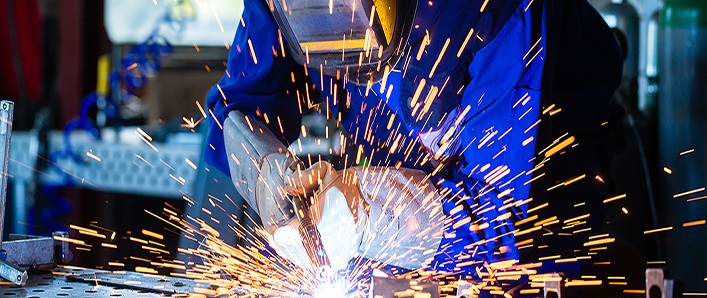WELDING AND FABRICATION TECHNOLOGY

The aim of welding skill training at the Gateway Industrial & Petro-Gas Institute is to teach the welding techniques and manipulative skills required for major welding processes. Welding technique is stressed above welding theory-as the trainees must be able to meet the welding performance demands of industry. Consequently, a minimum amount of course time (20%-30%) is spent on classroom lectures/discussions. The remaining time is used for supervised welding practice. The training program is tailored along the Nigeria Institute of Welding (NIW) and International Institute of Welding (IIW) standard. IIW was established to define guidelines for the education, training, qualification and certification of personnel involved in welding and NIW was empowered by Nigerian National Petroleum Corporation through Directive No.9 to conduct all certification programmes in all welding activities in line with Nigerian Content Directives of the NNPC in Nigeria.
In order to meet the demand of the industries, the Institute has structured its welding training programme in line with the guidelines for International Welding Training Programme in the following welding and quality control techniques:SMAW- Shielded Metal Arc Welding, GTAW- Gas-Tungsten Arc Welding, GMAW- Gas-Metal Arc Welding, NDT- Non Destructive Test, Corrosion Control and coating.
An additional technique called the Oxyfuel/Oxyacetylene gas cutting is also incuded in our welding programme to cater for maintenance welding and cutting. We also offer training in welding metallurgy, codes, inspection, drafting and weld design.

GENERAL COURSE CONTENT FOR PROFESSIONAL DIPLOMA
Module A courses include: Fillet welding practice, Fillet welding, Workshop Technology, Technical maths, Technical drawing, Welding safety, Survival Swimming, Communication skills.
Module B courses include:
Plate Welding practice, Plate welding, Workshop Technology 11, Technical maths, Gas welding, Engineering Drawing, Weldinng safety 11, Survival Swimming 11, Communication skills 11, Projects Costing.Module C courses include:
Pipe welding practice, Pipe welding, MIG & TIG, Corrosion Control & Coating, NDT/QA&QC, Survival Swimming 111, Project Costing 11, Computer Aided Design.National Diploma (Innovation) courses:
National Board for Technical Education Curriculum
Employment opportunities:
Graduates will be employed as welding practitioners in oil and gas, construction, manufacturing and process industries within and outside Nigeria.
Final Award:
GIPI Professional Diploma and National Diploma (Innovation) Nigerian Institute of Welding Membership.Duration: Twelve (12) Months for Professional Diploma
Entry Requirements:
Open to applicants with the following; WASC, ND, BSc./HND in Engineering and Sciences or its equivalent ,for the 9-12 months programme. OND ,WASC, Trade Cert., C&G intermediate and Trade Test Certificate in Engineering and Sciences or its equivalent, for the 6 months programme. Applicants must be in good physical condition and also have good eyesight. We recommend that you have your vision tested and corrected, if necessary, before starting welding training.
Nature of Assessment:
Welding trainees are assessed by a combination of methods including: - Practical skill examinations - Written test/assignments - Attitude Evaluation
